Business Functional Areas and Skills for Effective Performance
VerifiedAdded on 2023/06/17
|10
|2042
|59
Report
AI Summary
This report provides an analysis of the key functional areas within a business organization, including marketing, human resource management, customer service, finance, research and development, and sales. It details the responsibilities of each department and further identifies the specific skills required for employees to effectively contribute to these areas. Skills are categorized as hard or soft, covering technical expertise, communication, problem-solving, interpersonal abilities, and leadership qualities. The report emphasizes the importance of these functional areas and employee skills in achieving business aims and objectives, promoting smooth operations, and preventing task duplication. This resource is helpful for students looking for detailed insights into business operations and employee development, with Desklib offering access to more related materials.

World of Work
Paraphrase This Document
Need a fresh take? Get an instant paraphrase of this document with our AI Paraphraser
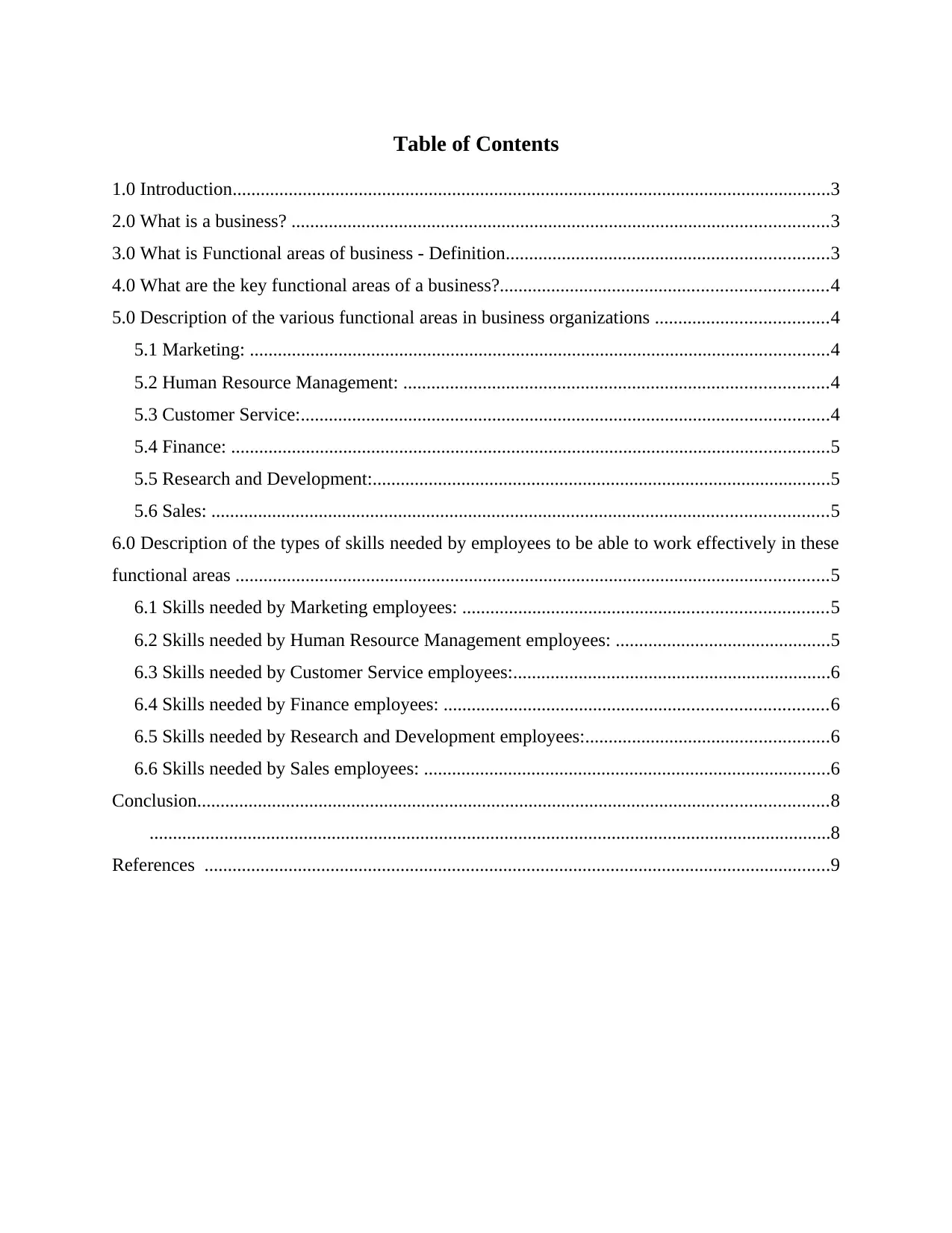
Table of Contents
1.0 Introduction................................................................................................................................3
2.0 What is a business? ...................................................................................................................3
3.0 What is Functional areas of business - Definition.....................................................................3
4.0 What are the key functional areas of a business?......................................................................4
5.0 Description of the various functional areas in business organizations .....................................4
5.1 Marketing: ............................................................................................................................4
5.2 Human Resource Management: ...........................................................................................4
5.3 Customer Service:.................................................................................................................4
5.4 Finance: ................................................................................................................................5
5.5 Research and Development:..................................................................................................5
5.6 Sales: ....................................................................................................................................5
6.0 Description of the types of skills needed by employees to be able to work effectively in these
functional areas ...............................................................................................................................5
6.1 Skills needed by Marketing employees: ..............................................................................5
6.2 Skills needed by Human Resource Management employees: ..............................................5
6.3 Skills needed by Customer Service employees:....................................................................6
6.4 Skills needed by Finance employees: ..................................................................................6
6.5 Skills needed by Research and Development employees:....................................................6
6.6 Skills needed by Sales employees: .......................................................................................6
Conclusion.......................................................................................................................................8
..................................................................................................................................................8
References ......................................................................................................................................9
1.0 Introduction................................................................................................................................3
2.0 What is a business? ...................................................................................................................3
3.0 What is Functional areas of business - Definition.....................................................................3
4.0 What are the key functional areas of a business?......................................................................4
5.0 Description of the various functional areas in business organizations .....................................4
5.1 Marketing: ............................................................................................................................4
5.2 Human Resource Management: ...........................................................................................4
5.3 Customer Service:.................................................................................................................4
5.4 Finance: ................................................................................................................................5
5.5 Research and Development:..................................................................................................5
5.6 Sales: ....................................................................................................................................5
6.0 Description of the types of skills needed by employees to be able to work effectively in these
functional areas ...............................................................................................................................5
6.1 Skills needed by Marketing employees: ..............................................................................5
6.2 Skills needed by Human Resource Management employees: ..............................................5
6.3 Skills needed by Customer Service employees:....................................................................6
6.4 Skills needed by Finance employees: ..................................................................................6
6.5 Skills needed by Research and Development employees:....................................................6
6.6 Skills needed by Sales employees: .......................................................................................6
Conclusion.......................................................................................................................................8
..................................................................................................................................................8
References ......................................................................................................................................9
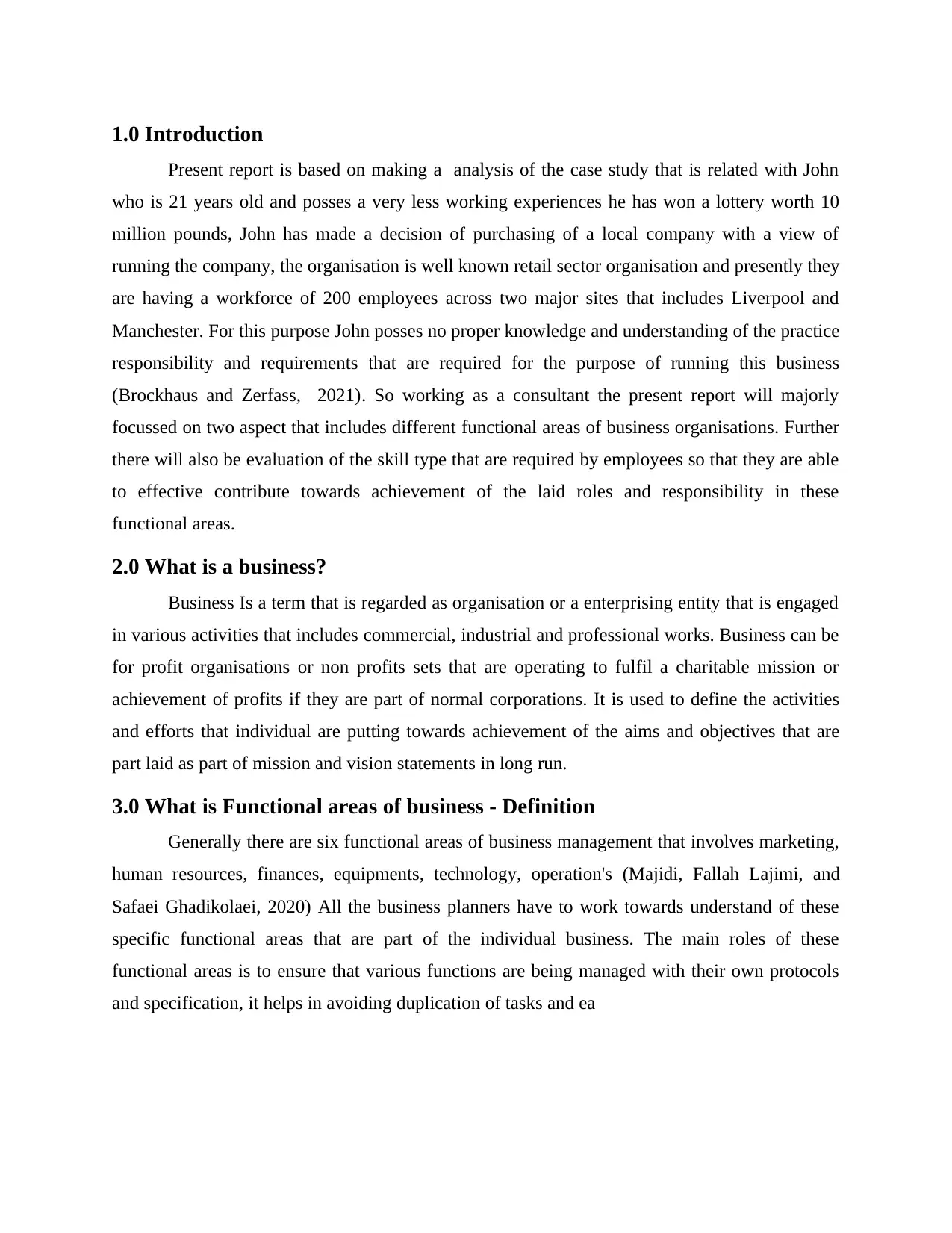
1.0 Introduction
Present report is based on making a analysis of the case study that is related with John
who is 21 years old and posses a very less working experiences he has won a lottery worth 10
million pounds, John has made a decision of purchasing of a local company with a view of
running the company, the organisation is well known retail sector organisation and presently they
are having a workforce of 200 employees across two major sites that includes Liverpool and
Manchester. For this purpose John posses no proper knowledge and understanding of the practice
responsibility and requirements that are required for the purpose of running this business
(Brockhaus and Zerfass, 2021). So working as a consultant the present report will majorly
focussed on two aspect that includes different functional areas of business organisations. Further
there will also be evaluation of the skill type that are required by employees so that they are able
to effective contribute towards achievement of the laid roles and responsibility in these
functional areas.
2.0 What is a business?
Business Is a term that is regarded as organisation or a enterprising entity that is engaged
in various activities that includes commercial, industrial and professional works. Business can be
for profit organisations or non profits sets that are operating to fulfil a charitable mission or
achievement of profits if they are part of normal corporations. It is used to define the activities
and efforts that individual are putting towards achievement of the aims and objectives that are
part laid as part of mission and vision statements in long run.
3.0 What is Functional areas of business - Definition
Generally there are six functional areas of business management that involves marketing,
human resources, finances, equipments, technology, operation's (Majidi, Fallah Lajimi, and
Safaei Ghadikolaei, 2020) All the business planners have to work towards understand of these
specific functional areas that are part of the individual business. The main roles of these
functional areas is to ensure that various functions are being managed with their own protocols
and specification, it helps in avoiding duplication of tasks and ea
Present report is based on making a analysis of the case study that is related with John
who is 21 years old and posses a very less working experiences he has won a lottery worth 10
million pounds, John has made a decision of purchasing of a local company with a view of
running the company, the organisation is well known retail sector organisation and presently they
are having a workforce of 200 employees across two major sites that includes Liverpool and
Manchester. For this purpose John posses no proper knowledge and understanding of the practice
responsibility and requirements that are required for the purpose of running this business
(Brockhaus and Zerfass, 2021). So working as a consultant the present report will majorly
focussed on two aspect that includes different functional areas of business organisations. Further
there will also be evaluation of the skill type that are required by employees so that they are able
to effective contribute towards achievement of the laid roles and responsibility in these
functional areas.
2.0 What is a business?
Business Is a term that is regarded as organisation or a enterprising entity that is engaged
in various activities that includes commercial, industrial and professional works. Business can be
for profit organisations or non profits sets that are operating to fulfil a charitable mission or
achievement of profits if they are part of normal corporations. It is used to define the activities
and efforts that individual are putting towards achievement of the aims and objectives that are
part laid as part of mission and vision statements in long run.
3.0 What is Functional areas of business - Definition
Generally there are six functional areas of business management that involves marketing,
human resources, finances, equipments, technology, operation's (Majidi, Fallah Lajimi, and
Safaei Ghadikolaei, 2020) All the business planners have to work towards understand of these
specific functional areas that are part of the individual business. The main roles of these
functional areas is to ensure that various functions are being managed with their own protocols
and specification, it helps in avoiding duplication of tasks and ea
⊘ This is a preview!⊘
Do you want full access?
Subscribe today to unlock all pages.

Trusted by 1+ million students worldwide
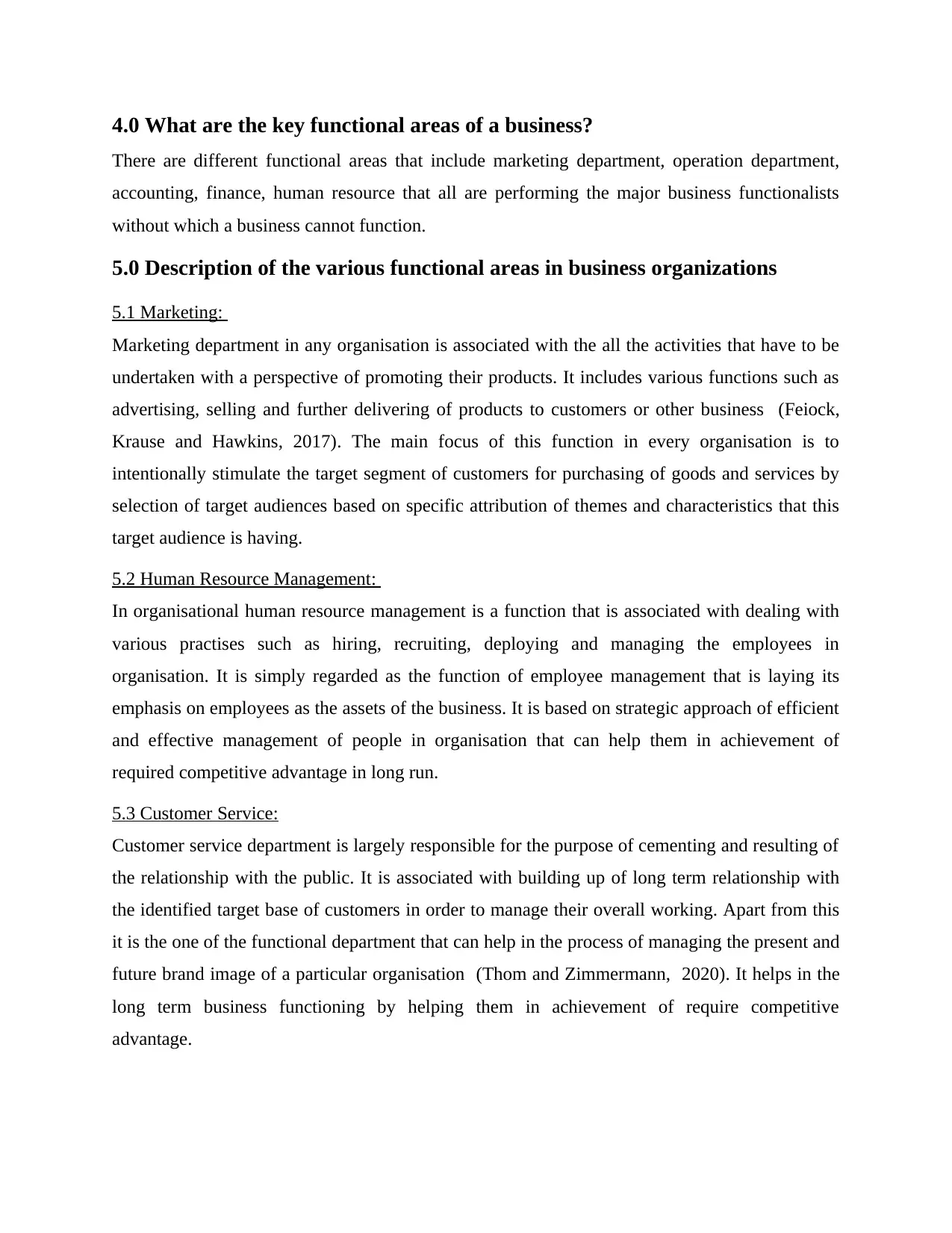
4.0 What are the key functional areas of a business?
There are different functional areas that include marketing department, operation department,
accounting, finance, human resource that all are performing the major business functionalists
without which a business cannot function.
5.0 Description of the various functional areas in business organizations
5.1 Marketing:
Marketing department in any organisation is associated with the all the activities that have to be
undertaken with a perspective of promoting their products. It includes various functions such as
advertising, selling and further delivering of products to customers or other business (Feiock,
Krause and Hawkins, 2017). The main focus of this function in every organisation is to
intentionally stimulate the target segment of customers for purchasing of goods and services by
selection of target audiences based on specific attribution of themes and characteristics that this
target audience is having.
5.2 Human Resource Management:
In organisational human resource management is a function that is associated with dealing with
various practises such as hiring, recruiting, deploying and managing the employees in
organisation. It is simply regarded as the function of employee management that is laying its
emphasis on employees as the assets of the business. It is based on strategic approach of efficient
and effective management of people in organisation that can help them in achievement of
required competitive advantage in long run.
5.3 Customer Service:
Customer service department is largely responsible for the purpose of cementing and resulting of
the relationship with the public. It is associated with building up of long term relationship with
the identified target base of customers in order to manage their overall working. Apart from this
it is the one of the functional department that can help in the process of managing the present and
future brand image of a particular organisation (Thom and Zimmermann, 2020). It helps in the
long term business functioning by helping them in achievement of require competitive
advantage.
There are different functional areas that include marketing department, operation department,
accounting, finance, human resource that all are performing the major business functionalists
without which a business cannot function.
5.0 Description of the various functional areas in business organizations
5.1 Marketing:
Marketing department in any organisation is associated with the all the activities that have to be
undertaken with a perspective of promoting their products. It includes various functions such as
advertising, selling and further delivering of products to customers or other business (Feiock,
Krause and Hawkins, 2017). The main focus of this function in every organisation is to
intentionally stimulate the target segment of customers for purchasing of goods and services by
selection of target audiences based on specific attribution of themes and characteristics that this
target audience is having.
5.2 Human Resource Management:
In organisational human resource management is a function that is associated with dealing with
various practises such as hiring, recruiting, deploying and managing the employees in
organisation. It is simply regarded as the function of employee management that is laying its
emphasis on employees as the assets of the business. It is based on strategic approach of efficient
and effective management of people in organisation that can help them in achievement of
required competitive advantage in long run.
5.3 Customer Service:
Customer service department is largely responsible for the purpose of cementing and resulting of
the relationship with the public. It is associated with building up of long term relationship with
the identified target base of customers in order to manage their overall working. Apart from this
it is the one of the functional department that can help in the process of managing the present and
future brand image of a particular organisation (Thom and Zimmermann, 2020). It helps in the
long term business functioning by helping them in achievement of require competitive
advantage.
Paraphrase This Document
Need a fresh take? Get an instant paraphrase of this document with our AI Paraphraser
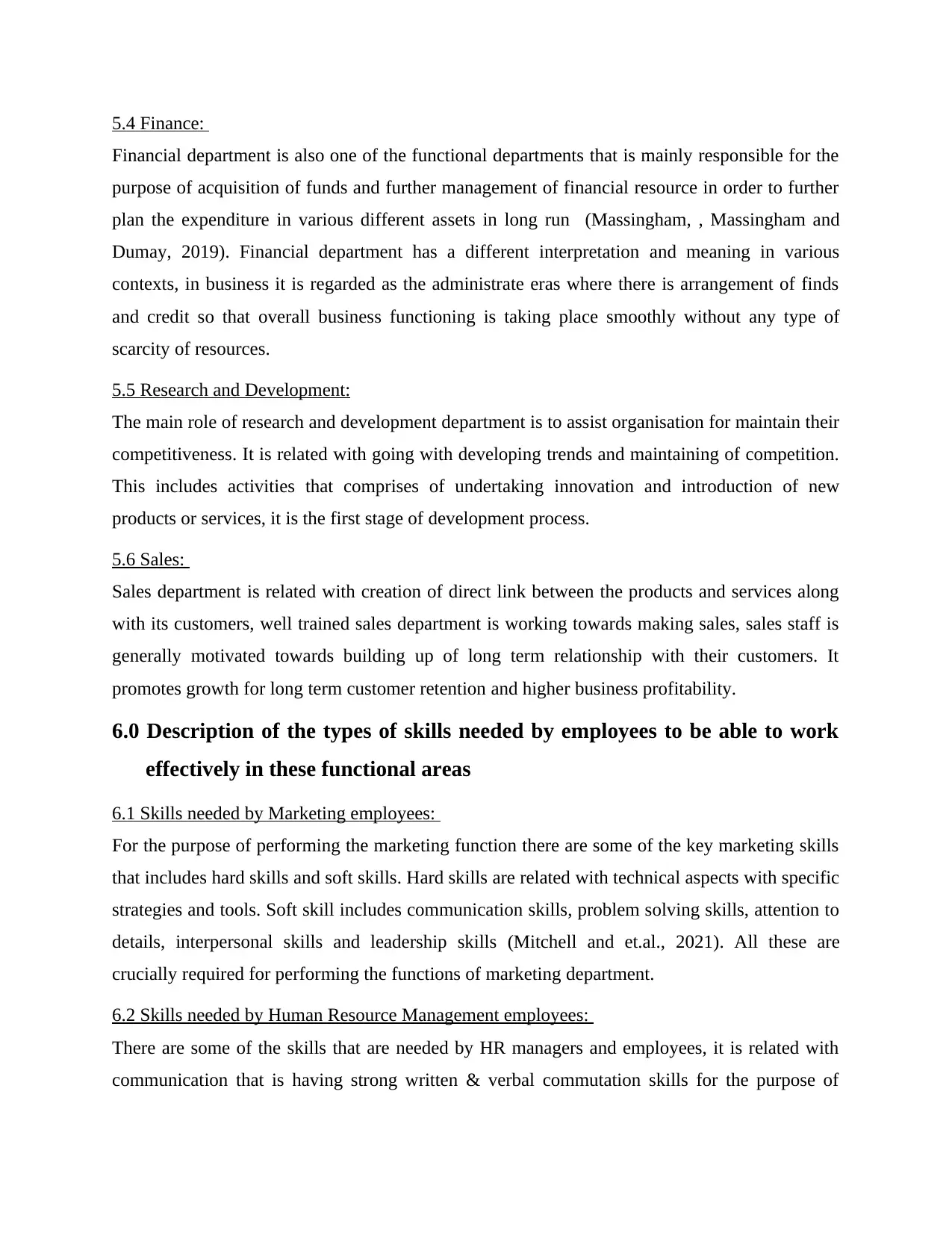
5.4 Finance:
Financial department is also one of the functional departments that is mainly responsible for the
purpose of acquisition of funds and further management of financial resource in order to further
plan the expenditure in various different assets in long run (Massingham, , Massingham and
Dumay, 2019). Financial department has a different interpretation and meaning in various
contexts, in business it is regarded as the administrate eras where there is arrangement of finds
and credit so that overall business functioning is taking place smoothly without any type of
scarcity of resources.
5.5 Research and Development:
The main role of research and development department is to assist organisation for maintain their
competitiveness. It is related with going with developing trends and maintaining of competition.
This includes activities that comprises of undertaking innovation and introduction of new
products or services, it is the first stage of development process.
5.6 Sales:
Sales department is related with creation of direct link between the products and services along
with its customers, well trained sales department is working towards making sales, sales staff is
generally motivated towards building up of long term relationship with their customers. It
promotes growth for long term customer retention and higher business profitability.
6.0 Description of the types of skills needed by employees to be able to work
effectively in these functional areas
6.1 Skills needed by Marketing employees:
For the purpose of performing the marketing function there are some of the key marketing skills
that includes hard skills and soft skills. Hard skills are related with technical aspects with specific
strategies and tools. Soft skill includes communication skills, problem solving skills, attention to
details, interpersonal skills and leadership skills (Mitchell and et.al., 2021). All these are
crucially required for performing the functions of marketing department.
6.2 Skills needed by Human Resource Management employees:
There are some of the skills that are needed by HR managers and employees, it is related with
communication that is having strong written & verbal commutation skills for the purpose of
Financial department is also one of the functional departments that is mainly responsible for the
purpose of acquisition of funds and further management of financial resource in order to further
plan the expenditure in various different assets in long run (Massingham, , Massingham and
Dumay, 2019). Financial department has a different interpretation and meaning in various
contexts, in business it is regarded as the administrate eras where there is arrangement of finds
and credit so that overall business functioning is taking place smoothly without any type of
scarcity of resources.
5.5 Research and Development:
The main role of research and development department is to assist organisation for maintain their
competitiveness. It is related with going with developing trends and maintaining of competition.
This includes activities that comprises of undertaking innovation and introduction of new
products or services, it is the first stage of development process.
5.6 Sales:
Sales department is related with creation of direct link between the products and services along
with its customers, well trained sales department is working towards making sales, sales staff is
generally motivated towards building up of long term relationship with their customers. It
promotes growth for long term customer retention and higher business profitability.
6.0 Description of the types of skills needed by employees to be able to work
effectively in these functional areas
6.1 Skills needed by Marketing employees:
For the purpose of performing the marketing function there are some of the key marketing skills
that includes hard skills and soft skills. Hard skills are related with technical aspects with specific
strategies and tools. Soft skill includes communication skills, problem solving skills, attention to
details, interpersonal skills and leadership skills (Mitchell and et.al., 2021). All these are
crucially required for performing the functions of marketing department.
6.2 Skills needed by Human Resource Management employees:
There are some of the skills that are needed by HR managers and employees, it is related with
communication that is having strong written & verbal commutation skills for the purpose of
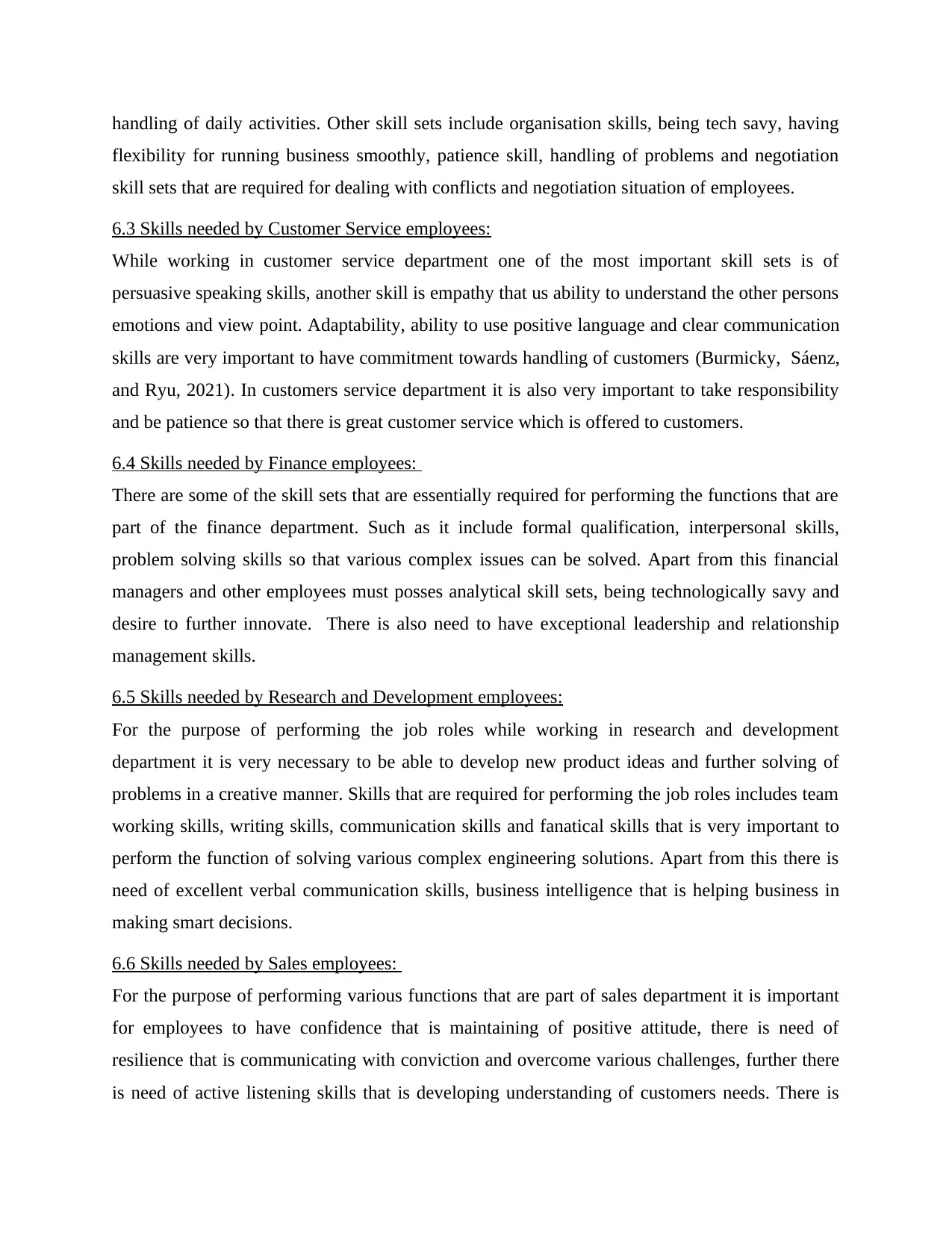
handling of daily activities. Other skill sets include organisation skills, being tech savy, having
flexibility for running business smoothly, patience skill, handling of problems and negotiation
skill sets that are required for dealing with conflicts and negotiation situation of employees.
6.3 Skills needed by Customer Service employees:
While working in customer service department one of the most important skill sets is of
persuasive speaking skills, another skill is empathy that us ability to understand the other persons
emotions and view point. Adaptability, ability to use positive language and clear communication
skills are very important to have commitment towards handling of customers (Burmicky, Sáenz,
and Ryu, 2021). In customers service department it is also very important to take responsibility
and be patience so that there is great customer service which is offered to customers.
6.4 Skills needed by Finance employees:
There are some of the skill sets that are essentially required for performing the functions that are
part of the finance department. Such as it include formal qualification, interpersonal skills,
problem solving skills so that various complex issues can be solved. Apart from this financial
managers and other employees must posses analytical skill sets, being technologically savy and
desire to further innovate. There is also need to have exceptional leadership and relationship
management skills.
6.5 Skills needed by Research and Development employees:
For the purpose of performing the job roles while working in research and development
department it is very necessary to be able to develop new product ideas and further solving of
problems in a creative manner. Skills that are required for performing the job roles includes team
working skills, writing skills, communication skills and fanatical skills that is very important to
perform the function of solving various complex engineering solutions. Apart from this there is
need of excellent verbal communication skills, business intelligence that is helping business in
making smart decisions.
6.6 Skills needed by Sales employees:
For the purpose of performing various functions that are part of sales department it is important
for employees to have confidence that is maintaining of positive attitude, there is need of
resilience that is communicating with conviction and overcome various challenges, further there
is need of active listening skills that is developing understanding of customers needs. There is
flexibility for running business smoothly, patience skill, handling of problems and negotiation
skill sets that are required for dealing with conflicts and negotiation situation of employees.
6.3 Skills needed by Customer Service employees:
While working in customer service department one of the most important skill sets is of
persuasive speaking skills, another skill is empathy that us ability to understand the other persons
emotions and view point. Adaptability, ability to use positive language and clear communication
skills are very important to have commitment towards handling of customers (Burmicky, Sáenz,
and Ryu, 2021). In customers service department it is also very important to take responsibility
and be patience so that there is great customer service which is offered to customers.
6.4 Skills needed by Finance employees:
There are some of the skill sets that are essentially required for performing the functions that are
part of the finance department. Such as it include formal qualification, interpersonal skills,
problem solving skills so that various complex issues can be solved. Apart from this financial
managers and other employees must posses analytical skill sets, being technologically savy and
desire to further innovate. There is also need to have exceptional leadership and relationship
management skills.
6.5 Skills needed by Research and Development employees:
For the purpose of performing the job roles while working in research and development
department it is very necessary to be able to develop new product ideas and further solving of
problems in a creative manner. Skills that are required for performing the job roles includes team
working skills, writing skills, communication skills and fanatical skills that is very important to
perform the function of solving various complex engineering solutions. Apart from this there is
need of excellent verbal communication skills, business intelligence that is helping business in
making smart decisions.
6.6 Skills needed by Sales employees:
For the purpose of performing various functions that are part of sales department it is important
for employees to have confidence that is maintaining of positive attitude, there is need of
resilience that is communicating with conviction and overcome various challenges, further there
is need of active listening skills that is developing understanding of customers needs. There is
⊘ This is a preview!⊘
Do you want full access?
Subscribe today to unlock all pages.

Trusted by 1+ million students worldwide

requirement of rapport building by selling of personality it will lead towards engaging of
customers for long run.
customers for long run.
Paraphrase This Document
Need a fresh take? Get an instant paraphrase of this document with our AI Paraphraser

Conclusion
It is concluded from the above made analysis that there are different functional
department that are working towards achievement of the laid business aims and objectives. There
are major functional areas that helps in smooth operations of business which also helps in
prevention of overlapping of activities in long run.
It is concluded from the above made analysis that there are different functional
department that are working towards achievement of the laid business aims and objectives. There
are major functional areas that helps in smooth operations of business which also helps in
prevention of overlapping of activities in long run.
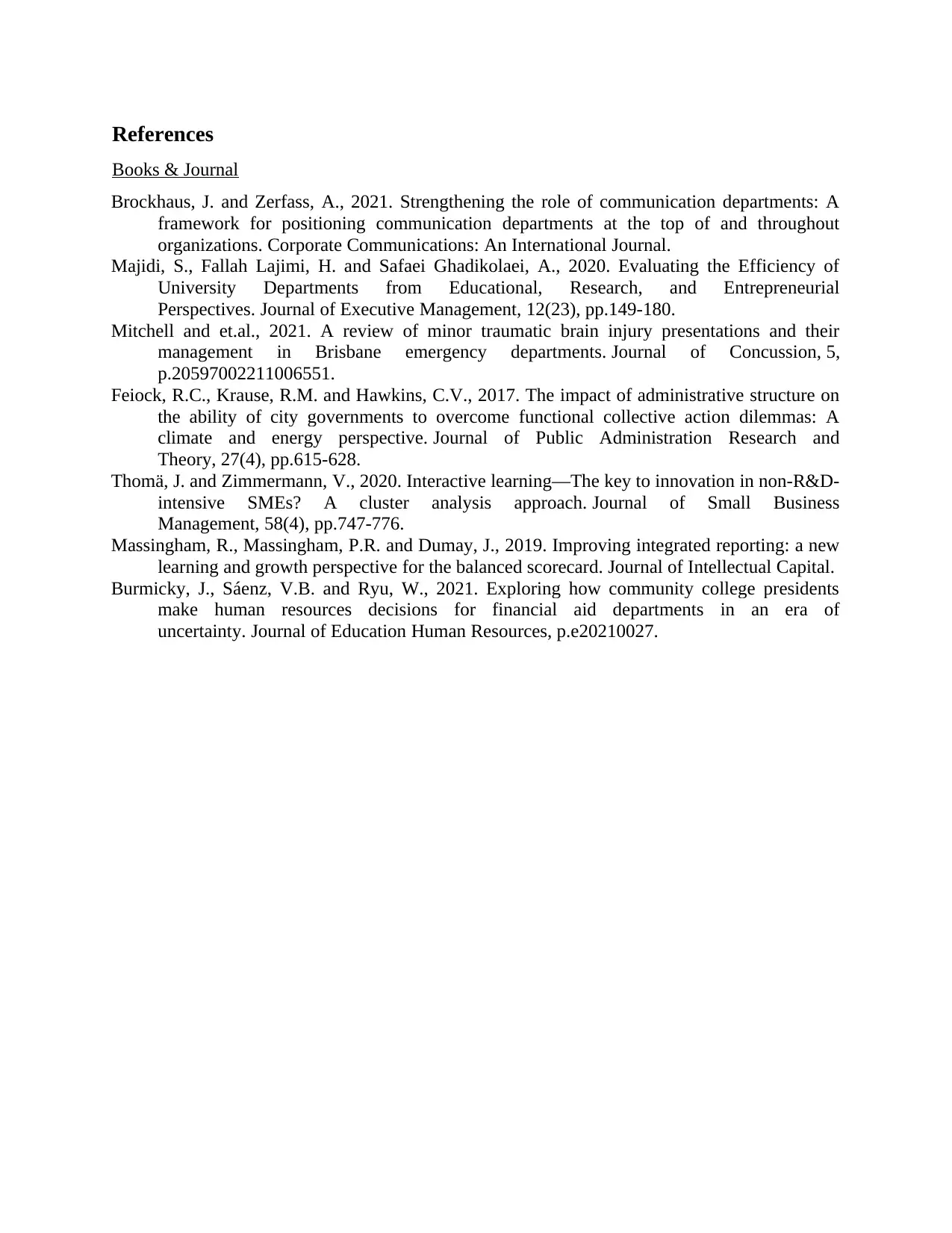
References
Books & Journal
Brockhaus, J. and Zerfass, A., 2021. Strengthening the role of communication departments: A
framework for positioning communication departments at the top of and throughout
organizations. Corporate Communications: An International Journal.
Majidi, S., Fallah Lajimi, H. and Safaei Ghadikolaei, A., 2020. Evaluating the Efficiency of
University Departments from Educational, Research, and Entrepreneurial
Perspectives. Journal of Executive Management, 12(23), pp.149-180.
Mitchell and et.al., 2021. A review of minor traumatic brain injury presentations and their
management in Brisbane emergency departments. Journal of Concussion, 5,
p.20597002211006551.
Feiock, R.C., Krause, R.M. and Hawkins, C.V., 2017. The impact of administrative structure on
the ability of city governments to overcome functional collective action dilemmas: A
climate and energy perspective. Journal of Public Administration Research and
Theory, 27(4), pp.615-628.
Thomä, J. and Zimmermann, V., 2020. Interactive learning—The key to innovation in non-R&D-
intensive SMEs? A cluster analysis approach. Journal of Small Business
Management, 58(4), pp.747-776.
Massingham, R., Massingham, P.R. and Dumay, J., 2019. Improving integrated reporting: a new
learning and growth perspective for the balanced scorecard. Journal of Intellectual Capital.
Burmicky, J., Sáenz, V.B. and Ryu, W., 2021. Exploring how community college presidents
make human resources decisions for financial aid departments in an era of
uncertainty. Journal of Education Human Resources, p.e20210027.
Books & Journal
Brockhaus, J. and Zerfass, A., 2021. Strengthening the role of communication departments: A
framework for positioning communication departments at the top of and throughout
organizations. Corporate Communications: An International Journal.
Majidi, S., Fallah Lajimi, H. and Safaei Ghadikolaei, A., 2020. Evaluating the Efficiency of
University Departments from Educational, Research, and Entrepreneurial
Perspectives. Journal of Executive Management, 12(23), pp.149-180.
Mitchell and et.al., 2021. A review of minor traumatic brain injury presentations and their
management in Brisbane emergency departments. Journal of Concussion, 5,
p.20597002211006551.
Feiock, R.C., Krause, R.M. and Hawkins, C.V., 2017. The impact of administrative structure on
the ability of city governments to overcome functional collective action dilemmas: A
climate and energy perspective. Journal of Public Administration Research and
Theory, 27(4), pp.615-628.
Thomä, J. and Zimmermann, V., 2020. Interactive learning—The key to innovation in non-R&D-
intensive SMEs? A cluster analysis approach. Journal of Small Business
Management, 58(4), pp.747-776.
Massingham, R., Massingham, P.R. and Dumay, J., 2019. Improving integrated reporting: a new
learning and growth perspective for the balanced scorecard. Journal of Intellectual Capital.
Burmicky, J., Sáenz, V.B. and Ryu, W., 2021. Exploring how community college presidents
make human resources decisions for financial aid departments in an era of
uncertainty. Journal of Education Human Resources, p.e20210027.
⊘ This is a preview!⊘
Do you want full access?
Subscribe today to unlock all pages.

Trusted by 1+ million students worldwide

1 out of 10
Related Documents
Your All-in-One AI-Powered Toolkit for Academic Success.
+13062052269
info@desklib.com
Available 24*7 on WhatsApp / Email
![[object Object]](/_next/static/media/star-bottom.7253800d.svg)
Unlock your academic potential
Copyright © 2020–2026 A2Z Services. All Rights Reserved. Developed and managed by ZUCOL.
